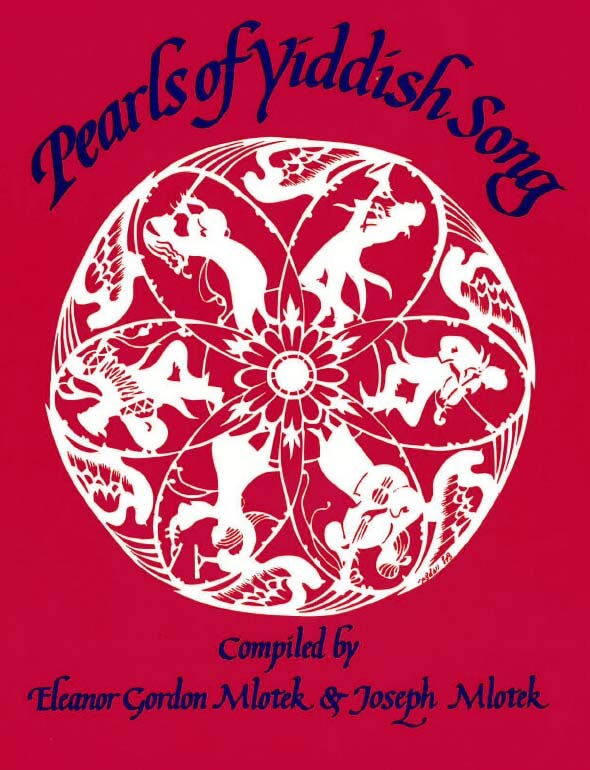Words by Hirsh Glik (1922-1944), poet-partisan of the Vilna Ghetto and author of the partisan hymn “Zog nisht keyn mol az du geyst dem letstn veg” (Never say this is your final road). Glik wrote “Dos zangl” in the forest near Vilna, where he worked in the peat bogs. He was later imprisoned in a concentration camp in Estonia and killed by the Germans in 1944. The song was published by S. Kaczerginski in 1948.

Blond as a cornstalk, you are,
and as beautiful as the sunset.
Lead me through mountains and valleys,
and then I [will lead] you again,
until we part.
And how they would look at the parting
in the rosy twilight, both of them,
lips like little carrots,
eyes full of tears,
and… better not to say anything.
Listen, maiden, to my request,
in the rosy sunset,
swear to me by the sunlight
that you will be mine, —
and she swore to him.
And she swore to him,
and he turned crimson.
Crimson like his desire,
crimson like the sunset
behind the blond corn.
To the sound of the shepherd’s pipe
the sunset went out,
and in the deep heavens
the moon, a sailing ship,
came up.
It followed them,
and hung up the stars,
and the stars above the two of them,
and the trees on either side
stood like the poles of a wedding canopy.
Blond bistu vi a zangl,
Sheyn vi der zun-fargangl,
Fir mikh durkh barg un tol,
Un ikh — dikh nokh a mol,
Biz mir veln zikh sheydn.
Un volt ir zen baym sheydn
In roze-shkle beydn,
Lipn, vi merelekh,
Oygn, ful trerelkh,
Un — beser gornisht reydn.
Her, meydl, mayn farlangl,
In rozn zun-fargangl,
Shver mir baym zunenshayn,
Az du vest mayne zayn, —
Un zi hot im geshvorn.
Un zi hot im geshvorn,
Purpur iz er gevorn,
Purpur vi der farlang,
Purpur vi zunfargang
Hinter di blonde korn.
In pastekhs flayfl-klangl
Lesht zikh der zun-fargangl,
Un in di himlen tif
Di levone — a zeglshif —
Iz shoyn aroysgegangen
Iz zi zey nokhgegangen
Un shtern oysgehangen,
Un shtern iber di tsvey,
Un beymer tsvishn zey —
Shteyen vi khupe-shtangen.
בלאָנד ביסטו װי אַ זאַנגל,
שײן װי דער זון־פֿאַרגאַנגל,
פֿיר מיך דורך באַרג און טאָל,
און איך — דיך נאָך אַ מאָל,
ביז מיר װעלן זיך שײדן.
און װאָלט איר זען בײַם שײדן
אין ראָזע־שקיעה בײדן,
ליפּן, װי מערעלעך,
אױגן, פֿול טרערעלעך
און — בעסער גאָרנישט רײדן.
הער, מײדל, מײַן פֿאַרלאַנגל,
אין ראָזן זון־פֿאַרגאַנגל,
שװער מיר בײַם זונענשײַן,
אַז דו װעסט מײַנע זײַן, —
און זי האָט אים געשװאָרן.
און זי האָט אים געשװאָרן,
פּורפּור איז ער געװאָרן,
פּורפּור וױ דער פֿאַרלאַנג,
פֿורפּור וױ זונפֿאַרגאַנג
הינטער די בלאָנדע קאָרן.
אין פּאַסטעכס פֿײַפֿל־קלאַנגל
לעשט זיך דער זון־פֿאַרגאַנגל,
און אין די הימלען טיף
די לבֿנה — אַ זעגלשיף —
איז שױן אַרױסגעגאַנגען.
איז זי זײ נאָכגעגאַנגען
און שטערן אױסגעהאַנגען,
און שטערן איבער די צװײ,
און בײמער צװישן זײ —
שטײען װי חופּה־שטאַננען.
Song Title: Dos Zangl

First published in 1988 as Pearls of Yiddish Song: Favorite Folk, Art and Theatre Songs, this anthology contains 115 songs. Some material had never been published, while others, included in rare song collections or sheet music, were largely inaccessible. The songs presented reflect Jewish life in Eastern Europe and the United States and depict childhood, love, family celebrations, poverty, work and struggle. There are also songs from the Hasidic and Maskilic movements, songs of Zion and of America, as well as songs from the Yiddish theater.
The title of this anthology derives from the weekly two-page feature column “Pearls of Yiddish Poetry,” which the compilers Yosl and Chana Mlotek initiated in 1970 in the Yiddish newspaper Der Forvertz (the Yiddish Daily Forward). Hundreds of readers from around the world — including authors, composers, singers, actors — became co-participants in this collective folk project and recalled melodies, lines, fragments, stanzas and their variants of songs, poems, and plays which they had heard in their youth. At first, readers sent in only written material. Later, they also taped songs on cassettes, many of whose melodies had, until then, never been recorded. They also identified and supplied missing information regarding lyricists, poets, and composers and described the circumstances surrounding the songs’ origins, their dissemination, diffusion and impact.